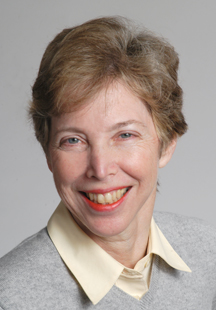Susan L. Graham: Difference between revisions
(Created page with "== Biography == Susan L. Graham’s seminal contributions and leadership have greatly influenced software development and high-performance computing. Together with her students...") |
No edit summary |
||
| (9 intermediate revisions by 4 users not shown) | |||
| Line 1: | Line 1: | ||
== | {{Biography | ||
|Image=Graham Susan.jpg | |||
|Birthdate=1942/09/16 | |||
|Birthplace=Cleveland, OH, USA | |||
|Associated organizations=University of California | |||
|Fields of study=Computing | |||
|Awards=2009 IEEE John von Neumann Medal, 2011 ACM-IEEE Ken Kennedy Award, 2013 Eta Kappa Nu Eminent Member | |||
}} | |||
Susan L. Graham’s seminal contributions and leadership have greatly influenced software development and high-performance computing. Together with her students, Dr. Graham’s programming language implementation innovations include a sophisticated pattern-matching algorithm for generating machine code for high-level languages, which is important for today’s processors, and an important and useful elimination-style algorithm for flow analysis. She introduced automatic error message generation as a useful tool, pointing the field in a new direction; as a result IBM has used automatic error message generation in several of its production compilers. She and her students developed the “gprof” profiling tool for analyzing the execution efficiency of programs and new algorithms for debugging programs. She led the development of the Berkeley Pascal compiler and the distribution of and extensions of [[UNIX|BSD Unix]]. Dr. Graham was also the co-creator of the Titanium language and system, which is used to develop parallel programs for scientific applications. | |||
Dr. Graham has served on the Presidential Information Technology Advisory Committee, where she was actively involved in influencing the U.S. Congress to bolster information technology spending. She co-chaired the National Research Council’s Future of Supercomputing committee. She was the chief computer scientist for the National Partnership for Advanced Computational Infrastructure, ensuring that the best computer science results were transferred into important computation-based science applications. She participates in a variety of science and engineering advisory groups. | |||
Dr. Graham | Her current research interest is on developing interactive language-aware tools for creating and maintaining software. An IEEE member, Dr. Graham is currently the Pehong Chen Distinguished Professor of Electrical Engineering and Computer Science Emerita and a professor in the Graduate School at the University of California, Berkeley. She received the 2009 IEEE John von Neumann Medal for "contributions to programming language design and implementation and for exemplary service to the discipline of computer science; and the 2011 ACM-IEEE Ken Kennedy Award “for foundational compilation algorithms and programming tools; research and discipline leadership; and exceptional mentoring.” In 2013, she was named an Eta Kappa Nu Eminent Member. | ||
{{DEFAULTSORT:Graham}} | |||
[[Category: | [[Category:Computing and electronics]] | ||
[[Category: | [[Category:Computer science]] | ||
[[Category:Computing]] | [[Category:Computing]] | ||
[[Category: | [[Category:High performance computing]] | ||
[[Category:Software_&_software_engineering]] | [[Category:Software_&_software_engineering]] | ||
Latest revision as of 16:10, 8 November 2017
- Birthdate
- 1942/09/16
- Birthplace
- Cleveland, OH, USA
- Associated organizations
- University of California
- Fields of study
- Computing
- Awards
- 2009 IEEE John von Neumann Medal, 2011 ACM-IEEE Ken Kennedy Award, 2013 Eta Kappa Nu Eminent Member
Biography
Susan L. Graham’s seminal contributions and leadership have greatly influenced software development and high-performance computing. Together with her students, Dr. Graham’s programming language implementation innovations include a sophisticated pattern-matching algorithm for generating machine code for high-level languages, which is important for today’s processors, and an important and useful elimination-style algorithm for flow analysis. She introduced automatic error message generation as a useful tool, pointing the field in a new direction; as a result IBM has used automatic error message generation in several of its production compilers. She and her students developed the “gprof” profiling tool for analyzing the execution efficiency of programs and new algorithms for debugging programs. She led the development of the Berkeley Pascal compiler and the distribution of and extensions of BSD Unix. Dr. Graham was also the co-creator of the Titanium language and system, which is used to develop parallel programs for scientific applications.
Dr. Graham has served on the Presidential Information Technology Advisory Committee, where she was actively involved in influencing the U.S. Congress to bolster information technology spending. She co-chaired the National Research Council’s Future of Supercomputing committee. She was the chief computer scientist for the National Partnership for Advanced Computational Infrastructure, ensuring that the best computer science results were transferred into important computation-based science applications. She participates in a variety of science and engineering advisory groups.
Her current research interest is on developing interactive language-aware tools for creating and maintaining software. An IEEE member, Dr. Graham is currently the Pehong Chen Distinguished Professor of Electrical Engineering and Computer Science Emerita and a professor in the Graduate School at the University of California, Berkeley. She received the 2009 IEEE John von Neumann Medal for "contributions to programming language design and implementation and for exemplary service to the discipline of computer science; and the 2011 ACM-IEEE Ken Kennedy Award “for foundational compilation algorithms and programming tools; research and discipline leadership; and exceptional mentoring.” In 2013, she was named an Eta Kappa Nu Eminent Member.
